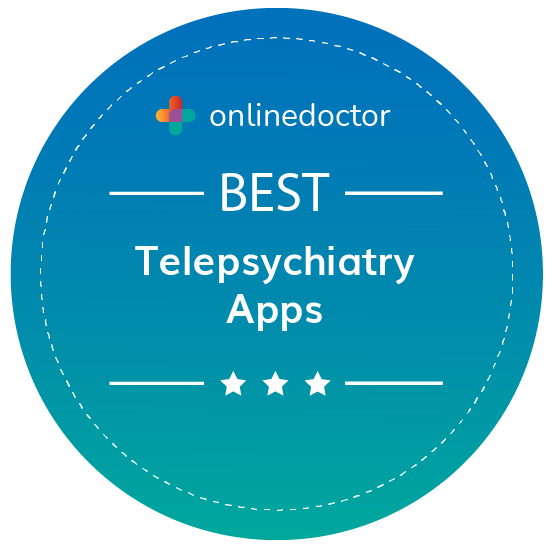The 6 Best Telepsychiatry Apps of 2024
TABLE OF CONTENTS
I. The 6 Best Telepsychiatry Apps of 2024
Sesame – Best Overall
Sesame’s dynamic marketplace gives patients the tools to refill their prescriptions, get an online consultation, and more – regardless of location, income, or insurance status.
Cerebral – Best for Unlimited Messaging
Cerebral has a variety of subscription plans, letting you have unlimited online messaging with your psychiatrists. Plans range from therapy only to therapy and medication management.
MDLIVE – Best for Monthly Therapy
At $108 for each month’s psychiatrist session, MDLIVE’s visits are usually less than you would pay for an in-person counselor. The site employs psychiatrists to prescribe for and diagnose more severe conditions.
Amwell – Best for Coordinated Care
Amwell’s psychiatrists will work with your primary care doctor to ensure a seamless transition of mental health care. They can also suggest controlled substances, which your PC doctor can then order.
Talkspace – Best for Specialized Therapy
Talkspace employs counselors who concentrate on marriage and family therapy, anxiety disorders, teen problems, and other mental health issues. They have board-certified psychiatrists on hand.
Teladoc – Best for People With Insurance
Teladoc works with many employer benefit plans and Medicare Advantage programs, offering sessions for as little as $0. The app has board-certified physicians and lets you choose your own psychiatrist.
II. How We Chose the Best Telepsychiatry Apps
Telepsychiatry apps vary in several ways, including the types of services offered. By examining the pros and cons of each app, you can find the one that works best for you. When evaluating apps, consider factors such as payment options and whether health insurance is accepted. You also want reliable service and assurance that your information is kept private.
What communication methods are offered?
Telepsychiatry apps can be loaded onto any smart device. All the ones we reviewed could be accessed from Android or iOS software. This gives you several options for connecting with your psychiatrist, including video calls, text messaging and live chat sessions.
What services are available?
Using these telepsychiatry apps, you can receive mental health services like counseling sessions, medication management, and new condition diagnosis. With licensed psychiatrists and doctors on staff, these apps let you receive health care comparable to in-person visits.
What is the wait time?
The best part of telepsychiatry apps — no waiting in doctor’s offices. Many offer 24/7 mental health care and the wait time is usually one to three days to get matched up with a physician or counselor.
III. The Best Telepsychiatry Apps of 2022
Sesame – Best Overall
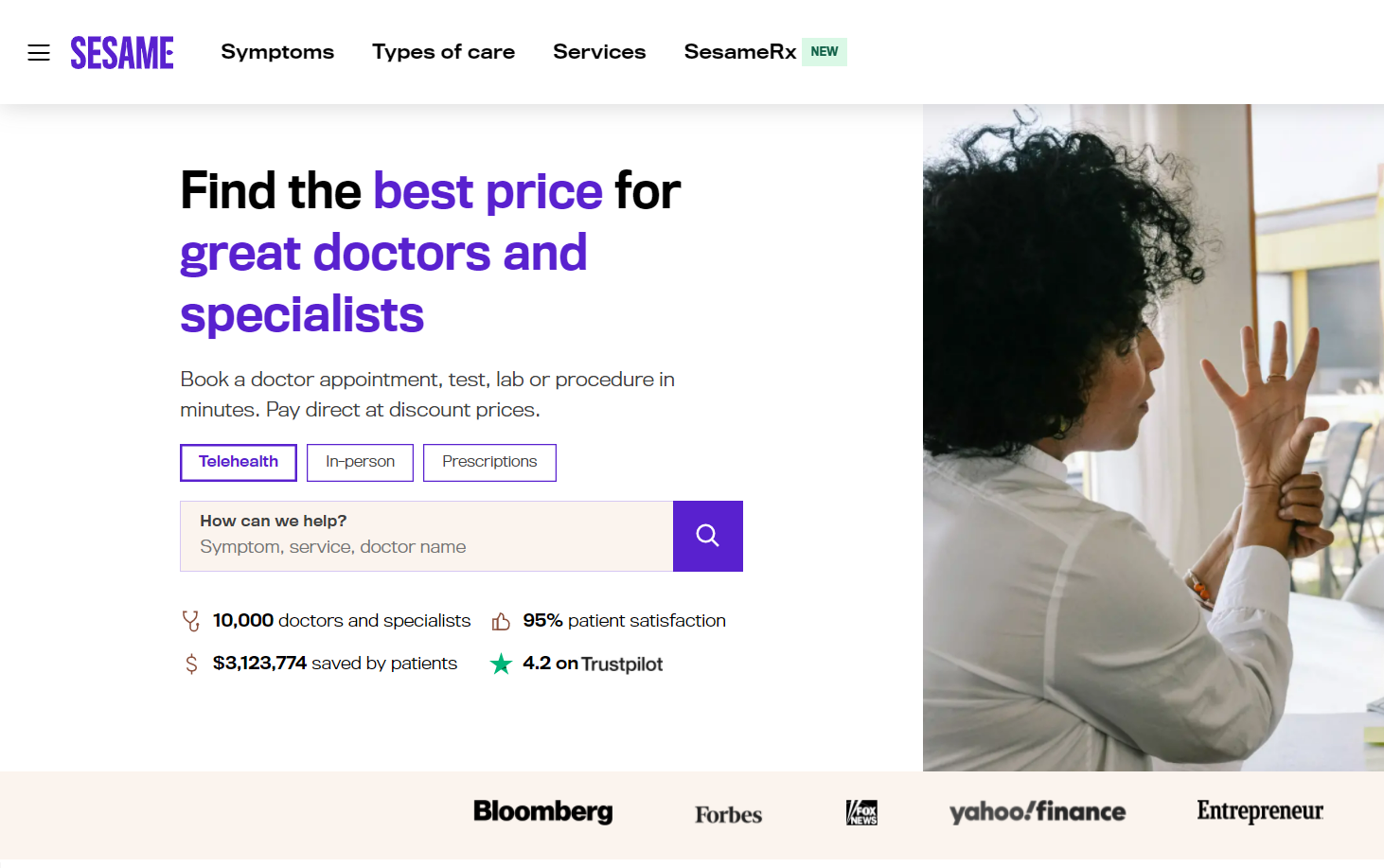
Sesame describes itself as a “superstore for great doctors and specialists,” providing a database of care options at discounted prices by paying care providers directly. Sesame can help you find a wide range of services in your area, from mental health and prescriptions to dental health and urgent care. Their website also allows you to search for care in four different ways – by location, by care type, by specialty, or by symptom – so you should have no problem finding mental health resources that suit your needs.
| Price | Accepts Insurance | Other Features |
| Free for basic membership $7 per month for Plus membership $25 Video prescription refill visit $105 Video mental health consultation |
No | –Discounted rates for doctors and specialists –Telehealth options –Free lab or blood test per year (with Plus membership) –Discounts on prescriptions –More features at Sesame |
Pros and Cons of Sesame
Pros:
- Not dependent on insurance coverage
- Easy to navigate database of available services in your area
- Plus membership offers good value for its monthly fee
Cons:
- Doesn’t accept health insurance, even if you have it
- Not available in all regions. Check Sesame’s website to see if the service is available in your area
What Are Customers Saying?
“I don’t have insurance and couldn’t risk paying hundreds for a bill. Knowing how much to pay upfront meant I could actually afford my doctor on Sesame.”
Cerebral – Best for Unlimited Messaging
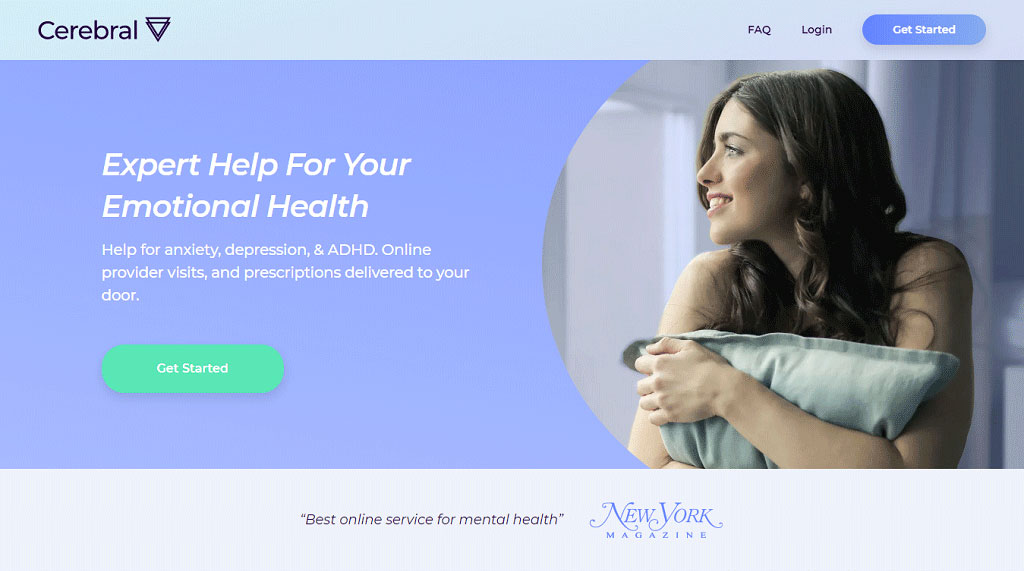
Signing up for Cerebral starts with an emotional assessment test, which can be completed on the company’s website, or by downloading the Cerebral app on your iOS or Android device. You can choose a provider based on your location, and appointments are available via video call, phone, or chat. If you have in-network insurance, you’ll have to connect via video.
Both care counseling and therapy subscription plans are available, with or without medication. Customer service is available via phone, text, and email Monday through Sunday. Cerebral providers can prescribe SSRI and SNRI medications, and the company accepts insurance from some major commercial health plans.
The psychiatrists at Cerebral are part of a physician-led, board-certified team. All psychiatrists on the platform are licensed and have obtained a graduate degree from an accredited institution. Cerebral providers offer treatment in 30 states and are all trained in evidence-based care.
| Price | Accepts insurance | Features |
| Medication + care counseling: $85/month, $29/month with in-network insurance
Medication + therapy counseling: $325/month, $29/month with in-network insurance Therapy only: $259/month |
Yes | -Mobile app -Prescriptions Mailed -Initial wait time seven days -Can diagnose conditions |
Pros and Cons of Cerebral
Pros:
- Get prescriptions delivered to your home
- With in-network insurance, it’s only $29/month
- Licensed psychiatrists and doctors
Cons:
- Expensive without insurance
- Can only use video if you’re billing in-network insurance
What Are Customers Saying
“Cerebral helped me at a very low point when I felt so unheard and even ignored by other healthcare providers in my area.”
MDLIVE – Best for Monthly Therapy
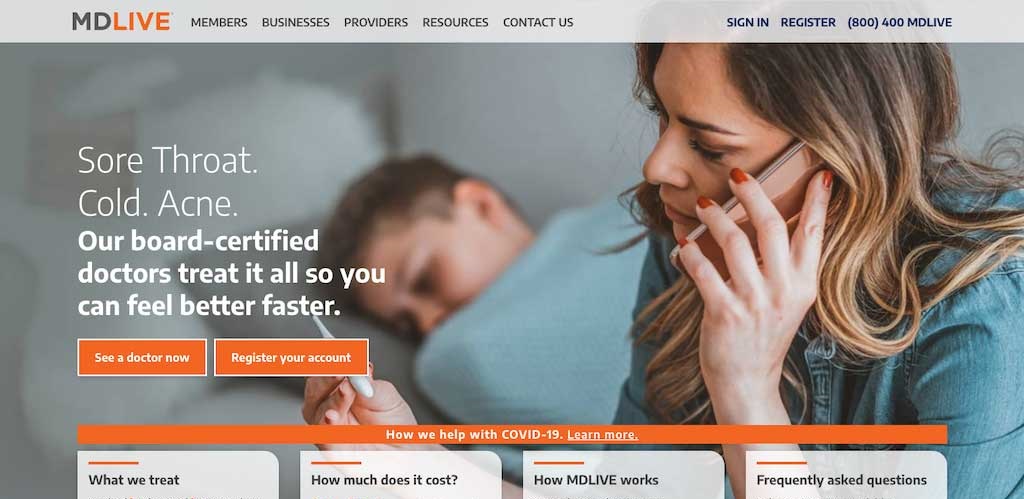
MDLIVE’s provider network includes board-certified physicians and licensed mental health professionals. A thorough background check is performed on all prospective providers to verify licensure and credentials and review any malpractice history. MDLIVE counselors and psychiatrists have at least 15 years of experience.
Doctors can write prescriptions for certain medications and send them to your local pharmacy for pickup. Many insurance providers are accepted, including Cigna, Blue Cross Blue Shield, and Humana. Patients can also reach customer support through the MDLIVE toll-free number or the question box on the company’s website.
MDLIVE requires patients to sign up for an account on the website or on the MDLIVE app, available for both iOS and Android devices. You can choose your doctor from the company’s directory, and appointments take place over the phone or through a video call.
| Price | Accepts insurance | Features |
| First visit: $285
Follow-up visits: $108/month |
Yes | -Prescription sent to the pharmacy of your choice -Select your psychiatrists from a directory -Live video and phone calls |
Pros and Cons of MDLIVE
Pros:
- Pick up prescriptions at a local pharmacy
- Set up an appointment within a few days
- Licensed psychiatrists and doctors
Cons:
- Expensive without insurance
- Can’t prescribe controlled substances
What Are Customers Saying
“My therapist is very understanding, smart, and gives practical advice.”
Amwell – Best for Coordinated Care
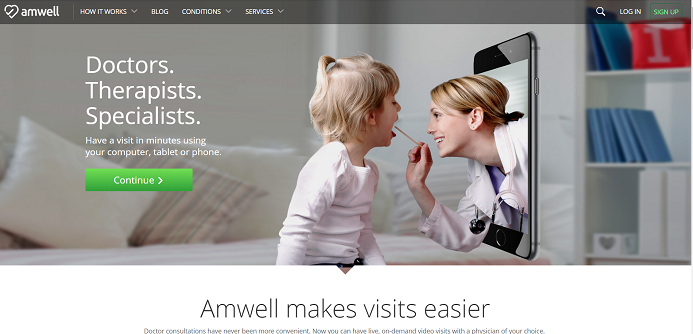
All mental health professionals at Amwell are board-certified and part of the Amwell Medical Group. Doctors have a minimum of 15 years of experience, and there are providers credentialed to work in every state.
You can sign up with Amwell online or by downloading the iOS or Android app. A drop-down menu of insurance providers is shown when registering, and you can choose your counselor from the Amwell psychiatrist directory.
Appointments are conducted by video chat, and psychiatrists can write prescriptions per your state’s laws. A full list of insurance providers that cover Amwell telehealth services is available on the company’s website. Customer support is available via phone and email.
| Price | Accepts insurance | Features |
| First visit: $269
Follow-up visits: $99 for each 15 minutes |
Yes | -Prescription available -Video calls -Choose your doctor |
Pros and Cons of Amwell
Pros:
- 24/7 availability
- Experienced, licensed psychiatrists can assess and provide treatment
- Will coordinate with your primary care doctor
Cons:
- Follow-up visits limited to 15 minutes
- Can’t prescribe controlled substances
What Are Customers Saying
“They helped me when no one would. I really appreciate this app. wish I had found it sooner thank you to these doctors who help people who really need it.”
Talkspace – Best for Specialized Therapy
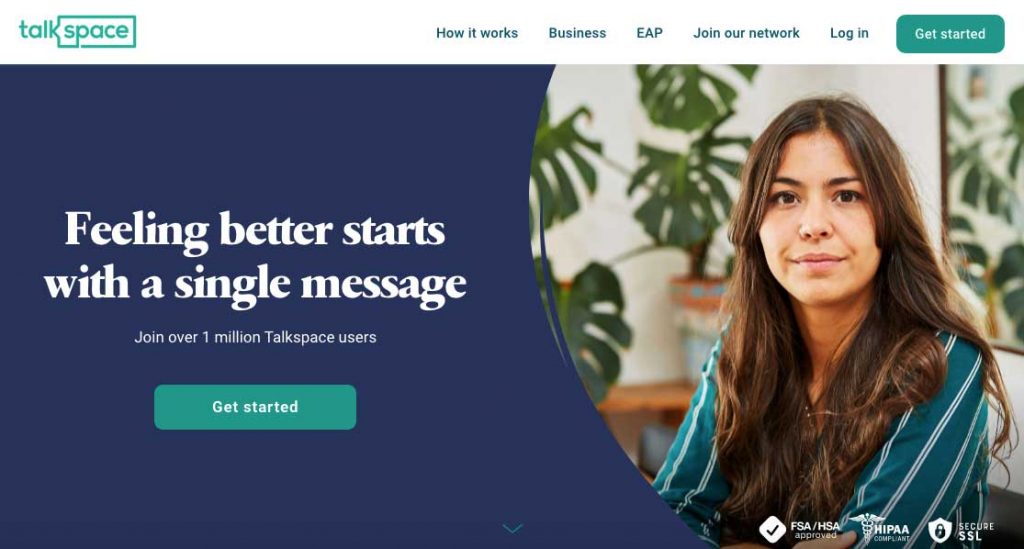
Talkspace psychiatrists are licensed social workers, marriage and family therapists, mental health counselors, and psychologists. Each undergoes a thorough screening process, including an in-depth evaluation to ensure their work meets the platform’s quality standard.
To access therapy services through Talkspace, you must register online or download the iOS and Android mobile app. psychiatrists are matched with patients through private consultation, and counselors can prescribe all medications that aren’t controlled substances. Talkspace currently accepts insurance from Premera, Cigna, and Optum. Partial reimbursement for telepsychiatry is available from certain out-of-network providers, and customer service is provided via email.
| Price | Accepts insurance | Features |
| First visit: $199
Follow-up visits: $125 |
Yes | -Video call -Prescriptions sent to local pharmacy -Psychiatrists and psychiatrists on staff are matched to you -More features at Talkspace |
Pros and Cons of Talkspace
Pros:
- Specialized care from licensed and thoroughly screened therapists
- Can choose therapy only or psychiatry with medication
- Can meet with same provider every time
Cons:
- Follow-up visits are expensive without insurance
- Can’t prescribe controlled substances
What Are Customers Saying
“The convenience is unmatched. I have a schedule of when to unwind and use my app, but it’s nice knowing I can access it whenever I need to.”
Teladoc – Best for People With Insurance
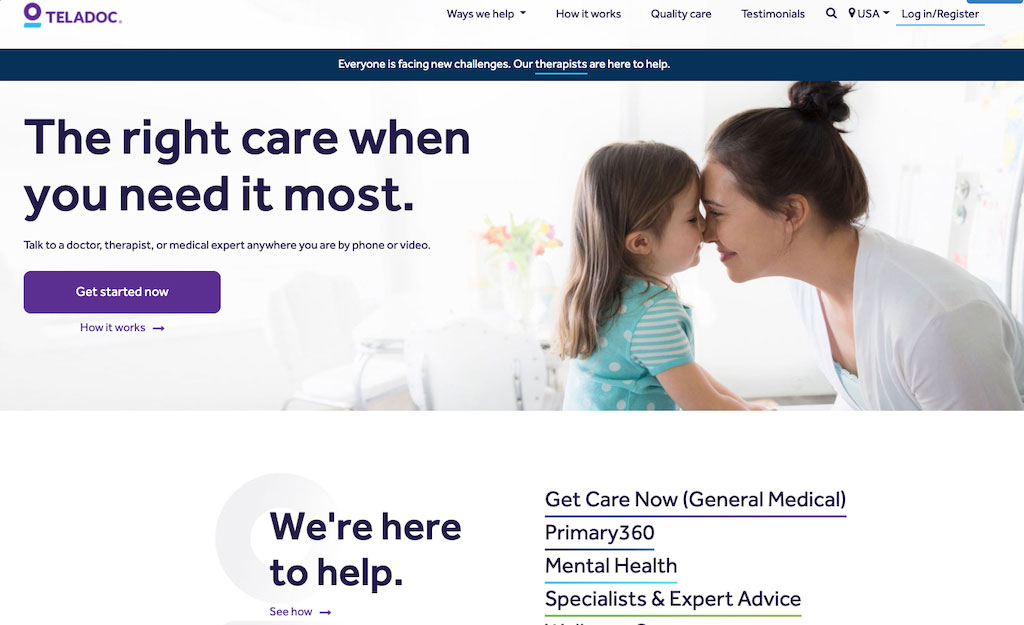
You can set up a Teladoc account on the company’s website or via the iOS or Android mobile app. The ability to select your psychiatrist depends on your insurance coverage, and prescriptions are written based on psychiatrist recommendations. Many health insurance plans cover Teladoc, and customer support is available via the toll-free number, Teladoc app, or website.
Teladoc psychiatrists are board-certified and licensed to work in all fifty states. After a thorough credentialing process, psychiatrists receive intensive training in virtual care. Services are available in 30 languages by a team of approximately 3,100 professionals.
| Price | Accepts insurance | Features |
| Without insurance: $99 per visit
With insurance: $0 per visit |
Yes | -Live video and phone calls -Prescriptions available -Include with many employer benefits plans and some Medicare plans |
Pros and Cons of Teladoc
Pros:
- Works with Medicare Advantage Plans
- One of the least expensive options
- Choose your psychiatrist
Cons:
- Must set up an account to find out if your insurance is accepted
- Can’t prescribe controlled substances
What Are Customers Saying
“Teladoc is fairly straightforward to use. Requesting an appointment is as simple as entering a few details about your request, choosing a timeframe, and how you’d like to be contacted.”
IV. What Do You Need to Know About Telepsychiatry Apps?
Why should I choose to use a telepsychiatry app?
One of the biggest pros of using a telepsychiatry app is accessibility. Flexible scheduling and the ability to attend remote sessions make these apps a convenient way to receive care while on-the-go or in your home.
What types of services and areas of expertise do telepsychiatry apps offer?
Therapists and psychiatrists are available via telepsychiatry apps to treat anxiety, depression, mood disorders, and relationship issues. You can book therapy sessions and talk with counselors directly within the platform. The professionals on most apps can prescribe medications, and some services offer prescription delivery.
How much do telepsychiatry apps cost?
Psychiatric telehealth services can be expensive, and telepsychiatry apps charge between $99 to $284 for individual visits and $259 for a monthly therapy plan. Apps that accept insurance may have lower in-network fees and some no fees at all.
Do telepsychiatry apps accept insurance?
All the apps we reviewed accepted some type of insurance. Most offered a much lower price for in-network visits and subscriptions. Telepsychiatry platforms are selective about which insurance plans they accept, so be sure to check with your prospective provider before scheduling a session.
Can online telepsychiatry apps prescribe medication?
Most telepsychiatry apps have professionals on staff who can prescribe medication. Telemedicine laws vary from state to state, so controlled substances and other certain drugs may have limitations on prescribing.
What if I need a lab test?
Should you need lab work, your provider may work with your primary care doctor or may call in a lab order to a local in-person lab. Sometimes you can use at-home testing.
V. Latest Telepsychiatry Apps News
Telemedicine is on the rise thanks to recent global health emergencies. By adding apps to already convenient platforms, telehealth providers are making mental health care even more accessible. From ways to make apps more user-friendly to emergency waivers, telepsychiatry apps must continually adapt.
- User researchers and data software engineers are focusing on what makes a great telehealth app. To serve a broad customer base, apps need to breach language barriers and be accessible to people with disabilities.
- COVID-19 caused lawmakers to enact a host of emergency measures regarding physicians licensing and the prescribing of controlled substances to make mental health care more accessible.
- Telepsychiatry apps may be the key to helping children and adolescents without access to quality care. Kids are tuned in to using phone-based apps, making therapy sessions more appealing.
VI. Sources
Find out what’s happening in the field of telemedicine and telepsychiatry.
- HealthIT.gov – Telemedicine and Telehealth
- Center for Connected Health Polity – Current State Laws and Reimbursement Policies
- HealthcareITNews – What do CIOs want to see from telehealth apps?
- American Psychiatric Association – Telepsychiatry Legal and Regulatory Considerations during COVID-19
- American Academy of Child & Adolescent Psychiatry – Telepsychiatry

